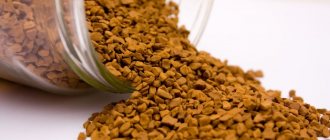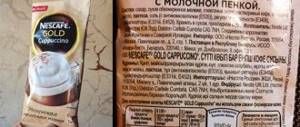We hope you don't drink instant. And that's why.
Just four letters connect millions of people around the world. The army of coffee lovers is growing every day.
The taste of coffee is wonderful, but incomprehensible. You need to learn to understand and love it, and only then enjoy it.
— Gustave Flaubert
Many of us love coffee, but didn’t come to it right away. Personally, at first I didn’t understand why drink coffee? What does it give? It doesn't charge me! Is there something wrong?
I delved deeper into the topic and everything fell into place.
What's in coffee
The structure of the coffee bean is simple. Like any cereal crop, there is an outer and inner shell. As coffee matures, two alkaloids accumulate in it:
- caffeine – in the outer shell;
- theobromine - in the inner shell.
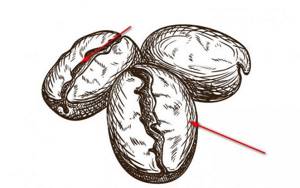
When we make coffee from whole beans, raw and ground, we get a drink that contains both alkaloids.
How does coffee work?
Coffee is a very personal drink. It, like cognac, cannot be drunk in mugs!
— Sir Winston Leonard Spencer-Churchill

Caffeine begins to act in the body almost instantly :
- constricts the blood vessels of all organs;
- dilates renal vessels.
A little theory.
Caffeine is colorless or white bitter crystals. Is a psychostimulant. In small doses it has a stimulating effect on the nervous system. With prolonged use, it can cause mild dependence - theism (disease). In large doses it causes exhaustion.
The duration of the invigorating effect of coffee is 20-25 minutes. Blood pressure increases in all organs and blood flow in the kidneys improves. The kidneys begin to receive better blood supply. This is partly why many people want to go to the restroom.
When caffeine has played its “symphony”, the second alkaloid appears on the scene - theobromine . Theobromine is a white crystalline powder with a slightly bitter taste.
Theobromine has the exact opposite :
- dilates the blood vessels of all organs;
- constricts renal vessels.
Systemic pressure decreases and renal blood flow deteriorates. A person begins to feel a slight tugging sensation in the kidneys.
, a glass of clean water is brought along with a cup of coffee . A decent coffee shop differs from an indecent one in that the second (decent) one always serves water with coffee, while the first (indecent) one only serves coffee.
Instant coffee - invigorates! It's verified!
In Europe, almost 80 percent of coffee lovers prefer exclusively natural ground coffee. Our compatriots are closer to the instant analogue: it is prepared quickly, and the caffeine content in it is no less, in some cases even more, than in ground coffee, which means that instant coffee fully fulfills its function as an invigorating drink. According to the standard, there are three types of natural instant coffee: • powdered , also called emulsified (in the form of a fine free-flowing powder without lumps) • granulated (in the form of fragile lumps of various shapes and sizes, porous structure) • sublimated , also frozen (in the form crystals with clear edges that flow in the jar in an even wave).
The cheapest segment among instant coffee is powdered coffee, since its production does not require any additional techniques. Coffee is turned into granules using special solutions. The quality of granulated coffee is usually slightly higher and the price is correspondingly higher.
Freeze-dried coffee is dried by deep freezing, hence the second name - frozen. With freeze drying, dehydration of the frozen product occurs under high vacuum conditions. With this method of removing water, the product is of high quality, the taste does not change, and the aroma is preserved. However, this process is energy-intensive, which is why the resulting coffee is the most expensive compared to other types of instant coffee.
Despite criticism from true coffee lovers who call instant coffee exclusively “chemicals,” this drink retains the taste and aroma properties and all the basic substances of natural coffee. During the production of the soluble version, caffeine goes first into the extract and then into powder granules. So the powder in jars is the same natural product as its ground counterpart.
As it turns out, even instant coffee is not protected from counterfeiting. Fraudsters, in pursuit of profit, add acorns, malt, figs, chicory, burnt sugar, caramelized products, and coffee bean shells to the raw materials. Impurities of coffee substitutes reduce the transparency of the infusion and give it a darker color. And the taste of the counterfeit will seem like a real disappointment to fans. The online magazine KATCHESTVO.RU decided to check the quality of popular and widely advertised brands of instant coffee. We purchased five samples: powdered “CAFÉ PELE”, granular “Nescafe Classic” and sublimated “Black Card Gold”, “Jacobs Monarch”, “Tchibo Exclusive” and sent them for examination to the testing center of the Sergiev Posad branch of the Federal State Institution “Mendeleev Center for Standardization” , metrology and certification".
Almost all instant coffee presented in the middle price segment, despite the beautiful foreign names, is produced in our country. Of our sample, only one sample of CAFÉ PELE coffee was produced in Brazil.
First, experts assessed the coffee for appearance, taste and aroma. As it turned out, all samples, without exception, met organoleptic standards.
Among the physicochemical indicators, those that directly reflect the quality of instant coffee were studied: the percentage of caffeine, ash, amount of carbohydrates and humidity.
Mass fraction of caffeine. For the medical profession, caffeine is a diuretic and a powerful cardiac stimulant known as trimethylxanthine. For most people, caffeine is a way to wake up and energize. Caffeine is one of the most important components of natural coffee, which determines its tonic properties. It is believed that instant coffee contains less caffeine and is therefore less harmful. This is not always true. And often even exactly the opposite. Moreover, the more expensive the instant coffee, the higher the caffeine content it contains.
According to GOST, the mass fraction of caffeine in powder should not be lower than 2.3 percent. In ground coffee, this figure is 0.7 percent (i.e. significantly lower), and usually varies depending on the variety from 0.7 to 1%.
In our samples, the amount of caffeine varied, but they all crossed the specified threshold. The most tonic coffee turned out to be Black Card Gold. But “Tchibo Exclusive” had the least amount of caffeine.
Moisture content. A very important indicator reflecting the safety of the product. Excess moisture can lead to mold development and product spoilage. However, our samples successfully passed this test - we did not find any missing coffee.
Mass fraction of ash. To check this indicator, the coffee must be burned. According to GOST, natural coffee must contain at least 6% ash. A higher content may indicate the quality of the product, while a lower content may indicate that it contains foreign ingredients, such as chicory or acorns. This type of coffee cannot be considered natural.
In all studied samples, the ash content turned out to be optimal. The record holder was the Black Card Gold coffee, and the lowest figure was for Nescafe classic.
Experts also calculated the amount of carbohydrates - glucose and xylose, which indicate the presence of coffee waste. But even with these indicators, everything was fine: all samples were kept at a decent distance from the maximum permissible values.
Solubility tests. According to GOST, high-quality coffee should dissolve quickly - no more than half a minute in hot water and up to 3 minutes in cold water. Experts have found that the most instant coffees are “Tchibo Exclusive” and “Black Card Gold”. But Jacobs Monarch and Nescafe classic cook a little slower.
Aflatoxins are waste products of microscopic mold fungi. They are most often found in grains and legumes, nuts, spices, figs and dried fruits. These toxic substances can accumulate in the human body over time and affect the liver, kidneys, lungs and brain. We tested coffee for Aflatoxin B1 content. Fortunately, all samples passed it without problems. So the safety of coffee also turned out to be okay.
Despite the fact that our samples performed exceptionally well, complaints about low-quality instant coffee are not decreasing. To prevent buying another jar of tonic drink from turning into buying a pig in a poke, follow our advice.
The first rule for a coffee lover: when purchasing, take a close look at the color and structure of the coffee. The granules (if they are not powder) should be large, dense, not crumbly, and light brown in color. Dark coffee is usually over-roasted.
Coffee in cans is somewhat cheaper than the product in glass, but it should not be preferred. After all, it is impossible to examine the contents when purchasing. This is why a careless manufacturer sells low-quality products in opaque packaging.
Do not hesitate to ask for documents confirming the quality and safety of the product. The price is also too low. A jar of good quality coffee cannot cost less than 100 rubles.
Laboratory results
“Tchibo Exclusive” Natural instant freeze-dried coffee Net weight 95 g, GOST R 51881-2002 Manufactured and packaged: Tchibo CIS LLC, Moscow. Production address: M.O., Yegoryevsk Date of production: 11.2010 Batch number: Y1141 Use before: A 03.18.2011 Mass fraction of moisture – 4.0% (norm – no more than 6.0%) Mass fraction of caffeine – 3, 11% (norm - no less than 2.3%) Mass fraction of ash - 7.6% (norm - no less than 6.0%) Complete solubility - 0.1 and 0.3 min (norm - no more than 0.5 min in hot water, no more than 3.0 minutes in cold water) Conclusion: The sample meets the requirements of SanPiN 2.3.2.1078 - 01, GOST R 51881 - 2002.
“Jacobs Monarch” Natural instant freeze-dried coffee Net weight 95 g, GOST R 51881-2002 Manufacturer: Kraft Foods Rus LLC Production address: Leningrad region, Lomonosov district, industrial zone “Gorelovo” Date of production: 22.03. 2011 Batch number: DSP0111222 Use before: 03/22/2013 Mass fraction of moisture – 5.4% (norm – no more than 6.0%) Mass fraction of caffeine – 3.35% (norm – no less than 2.3%) Mass fraction of ash – 7.8% (norm – not less than 6.0%) Complete solubility – 0.2 and 0.6 min (norm – no more than 0.5 min in hot water, no more than 3.0 min in cold water) Conclusion : The sample meets the requirements of SanPiN 2.3.2.1078 - 01, GOST R 51881 - 2002.
“Nescafe classic” Natural instant granulated coffee Net weight 100 g, GOST R 51881-2002 Manufacturer: Nestle Kuban LLC Production address: Krasnodar region, Timashevsk Date of production: November 28, 2010 Batch No.: 0333089582 Use before: November 28. 2012 Mass fraction of moisture – 4.5% (norm – no more than 6.0%) Mass fraction of caffeine – 4.20% (norm – no less than 2.3%) Mass fraction of ash – 6.4% (norm – no less 6.0%) Complete solubility - 0.2 and 0.6 min (norm - no more than 0.5 min in hot water, no more than 3.0 min in cold water) Conclusion: The sample meets the requirements of SanPiN 2.3.2.1078 - 01 , GOST R 51881 – 2002.
“CAFE PELE” Natural instant powdered coffee Net weight 200 g Manufacturer: , Brazil Date of production: 05/20/2010 Batch number: L03741050640622005 Use before: 05/20/2012 Mass fraction of moisture – 2.9% (norm – no more than 6.0% ) Mass fraction of caffeine – 3.76% (norm – no less than 2.3%) Mass fraction of ash – 7.8% (norm – no less than 6.0%) Complete solubility – 0.1 and 0.5 min (norm - no more than 0.5 minutes in hot water, no more than 3.0 minutes in cold water) Conclusion: The sample meets the requirements of SanPiN 2.3.2.1078 - 01, GOST R 51881 - 2002.
“Black Card Gold” Natural instant freeze-dried coffee Net weight 100 g, GOST R 51881-2002 Manufacturer: Grand NN LLC (Nizhny Novgorod) by order (Moscow region, Odintsovo district, VNIISSOK settlement) Date production: 03/09/2011 “Y” Use before: 03/09/2013 Mass fraction of moisture – 3.2% (norm – no more than 6.0%) Mass fraction of caffeine – 4.22% (norm – no less than 2.3%) Mass fraction of ash – 8.1% (norm – no less than 6.0%) Complete solubility – 0.1 and 0.3 min (norm – no more than 0.5 min in hot water, no more than 3.0 min in cold water) Conclusion: The sample meets the requirements of SanPiN 2.3.2.1078 - 01, GOST R 51881 - 2002.
Attention: how to drink coffee correctly

You drank a cup of coffee. After 20 minutes, drink a glass of water . Exactly like that and in that sequence.
Thus, prevent the phase of impaired water-salt metabolism: do not allow the kidneys to fall into a state of impaired blood flow. Live and learn.
There is only one “but”: all of the above applies to bean coffee.
Secrets of instant coffee
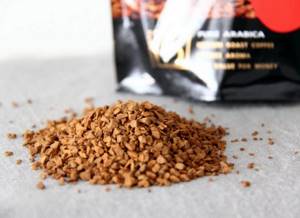
When the caffeine fraction is extracted from coffee, the outer shell of the grain is removed. This part goes to medications, caffeine and caffeine-containing drinks (for example, citramon, energy drinks, and so on).
The inner shell of the grain is used to produce instant and granulated coffee.
An interesting fact that makes you think. The Americans are trying to push through a law so that all cans of granulated coffee should be labeled “decaffeinated coffee . Some manufacturers are already writing.
In fact, any granulated or instant coffee contains from 5% to 10% caffeine fractions. As a rule, you do not feel any invigorating effect, blood pressure does not increase, and after this coffee you want to sleep .
You should drink instant coffee in the evening (closer to the night) - you will sleep better. That's the whole effect.
Harm and benefits of instant coffee
Instant coffee is often preferred to grain coffee because it is hoped that it contains less caffeine. This, unfortunately, is not the case. The caffeine content in instant coffee is not much lower: while brewed coffee contains about 80 mg per cup, instant coffee contains about 60 mg.
- 330
More details - 171
More details
- 1224 1152
More details
- 630
More details
Brewed coffee may contain even less caffeine than instant coffee if you brew the drink very quickly and bring it to a boil only once (brewed coffee is often brought to a boil 3 times to get a richer drink).
Caffeine is a rather complex and controversial substance. It has the property of increasing blood pressure, which improves the well-being of hypotensive people (people with low blood pressure), but it is strictly contraindicated for hypertensive patients.
In addition, caffeine has an invigorating effect and improves mood by increasing the happiness hormone serotonin in the blood. But these same positive qualities can also turn out to be negative if you abuse coffee. If you drink more than 2 cups a day, your body begins to demand its share of energy and becomes dependent on caffeine. In this case, if you give up coffee, you will have to go through a period of abstinence - the person feels lethargic and drowsy, a decrease in reaction speed, and headaches may occur.
Instant coffee contains quite a lot of caffeine and dyes, flavors and preservatives. Natural coffee either does not contain them at all, or contains much less. One of the most negative effects of coffee on humans is a strong increase in acidity, therefore instant coffee is not recommended for people with chronic diseases of the gastrointestinal tract.
To a large extent, due to increased acidity, instant coffee speeds up the digestion process, which inspires hope for weight loss. But in practice it leads primarily to skin laxity and the development of cellulite.
Coffee washes out many vitamins and nutrients from the body (A, B, PP, potassium, calcium, zinc, magnesium, iron), it also dehydrates the body. As a result, a person who drinks coffee for several years, every day and more than one cup (and we remember that coffee is conducive to this, since it causes some addiction) develops sluggish, dehydrated, dull skin and becomes like a patient or alcoholic.
Then what kind of coffee should you drink?
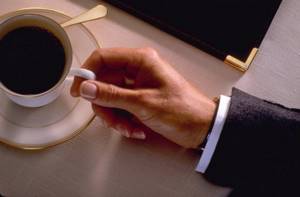
We only get the caffeine effect from whole bean coffee. After this, we must be prepared for the onset of the theobromine phase - the opposite effect.
The theobromine stage occurs when drinking any type of coffee, no matter what quality.
Some varieties maintain the “caffeine stage” for up to 30 minutes. But then you still get the theobromine stage. Its duration is much longer, about 60-70 minutes.
Everyone can feel this for themselves. The phase of activation and surge of energy feels good, after which you want to relax a little.
Therefore, it is important to remember: by drinking plain water at the right time, the stage of the negative effect is reduced. You prevent deterioration of renal blood flow.
Therefore, now knowing the mechanism of action of coffee, make it a rule: always drink water after a cup of coffee. Your kidneys will thank you!
What to drink from coffee in Russia
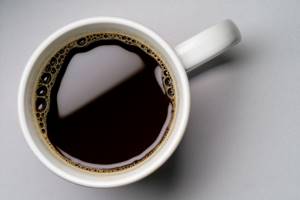
Many people in Russia only have access to instant coffee. It can be cheap. And dear.
When buying instant coffee, remember: THERE IS NO DIFFERENCE.
Typical situation. Beautiful packaging, high price. Having prepared it, we get the opposite effect: there is no vigor, and after 20-25 minutes the theobromine phase “creeps up”. I want to sleep, my blood pressure does not increase (which is a definite plus for hypertensive patients). Without knowing this mechanism, people find themselves in unpleasant, sometimes even tragic situations.
For example, a truck driver or taxi driver, driving out into the night, drinks several cups of instant coffee. Naturally, he does not receive the expected cheerfulness. After 25–30 minutes, theobromine begins to act, and the person falls asleep while driving. This effect is also called the “30 kilometer” effect .
Therefore, in situations where you need to be alert, it is not recommended to take instant or granulated coffee with you - only ground beans or, even better, strong tea. Leaf tea (including green tea) contains caffeine without theobromine, which will provide the necessary energy.
Why coffee doesn't invigorate you and how a caffeine hangover occurs

In advertising you can often hear phrases about an invigorating cup of coffee in the morning, and millions of people around the world are convinced that a morning cup of coffee charges them with energy for the whole day. But the fact is that coffee does not invigorate us at all. To know how caffeine actually works, we must first understand how we get the need to sleep...
Immediately after you wake up, a special substance begins to accumulate in your brain - adenosine
, it is also called
the “fatigue hormone”
. And the longer you stay awake, the greater its concentration in the brain. A large amount of adenosine leads to an increasing desire to sleep, as it “jams” the signals of the brain lobes responsible for wakefulness and at the same time stimulates those areas that are responsible for sleep. Thanks to this action, when the high concentration of the fatigue hormone reaches its peak level, you are overcome by an uncontrollable desire to sleep. Sooner or later this happens to all of us, most after 12-16 hours of wakefulness.
The effect of adenosine can be weakened by caffeine, a psychostimulant found in coffee. Caffeine will make you feel more alert, but, unlike adenosine, this substance does not stimulate the areas of the brain responsible for wakefulness and does not destroy the “fatigue hormone.” Instead, caffeine blocks the brain's sleep-signaling receptors that adenosine would act on. This is how caffeine “tricks” the brain and makes you feel alert even despite the high concentration of adenosine, which would force you to fall asleep.
The half-life of caffeine from the body is about 6 hours. This means that the caffeine contained in a cup of coffee that you drank at 19 o'clock will be eliminated from the body only by one in the morning, and the rest will be cleared from the brain only in the morning.

Enzymes produced by the liver are responsible for the process of removing caffeine from the body. And since the liver is “not made of iron” and tends to wear out, with age it takes more and more time to eliminate caffeine and we become more susceptible to the caffeine effect.
If you decide to fight sleep with coffee, then get ready for very unpleasant consequences of consuming caffeine. The apparent energy boost received after drinking coffee will begin to decline rapidly after some time. It will be increasingly difficult for you to concentrate on something, and sleep will come with a new, more powerful force and will be accompanied by nasty symptoms as a bonus. This is called caffeine withdrawal.
The reason for caffeine withdrawal is that while caffeine is present in the body, it blocks the sleepiness receptors that adenosine acts on. But adenosine itself does not disappear anywhere and its amount continues to grow. But the brain, deceived by caffeine, has no idea about this.
As soon as the liver enzymes destroy the “caffeine blockade,” the sleep receptors will be hit by a powerful wave of adenosine, which caused drowsiness before you drank that very cup of coffee and the adenosine that additionally accumulated during the caffeine blockade. Because of this, you will feel an unbearable desire to sleep, caused by the “fatigue hormone”; in addition to everything, such unpleasant things as headache, fatigue, irritability, depressed mood, nausea and muscle pain may appear.
Source:Go
Read us on Odnoklassniki VKontakte Telegram
Share
012
Harsh production statistics
Let's look at the statistics of coffee production around the world from 2001 to 2015. Data is in thousands and 60 kilogram bags.
Information taken from the open source International Coffee Organization.
In order to visually see the dynamics, let's build a diagram .
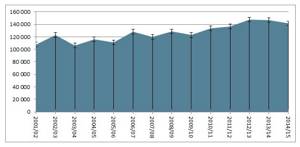
The numbers reflect the scale of coffee consumption.
A pattern can be drawn: when the world economy is in a fever, the demand for coffee grows and, as a result, its production.
How coffee changes your mind
Finally, a very interesting fact. Australian scientists from the University of Queensland have found that a person who has consumed a certain dose of caffeine is more easily susceptible to psychological influence .

This conclusion was made based on experiment. 140 volunteers took part in it. Each of the subjects was asked in advance about their position on a specific topic. They divided everyone into two groups: the first group was asked to drink several cups of coffee, while the second group was left without a drink.
Counter-arguments against the participants' positions were then provided. And the most interesting thing: those who did not drink the coffee drink did not change their opinion. Lovers of the strong drink were inclined to change their point of view , and some of them changed their minds after listening to the arguments.
Scientists characterize these actions by the fact that a person who drinks coffee experiences a kind of euphoria, and therefore is more relaxed in his behavior and judgment.
Next time at negotiations, I will probably refuse a cup of aromatic coffee. And I advise you 

( 10 votes, overall rating: 4.80 out of 5)


